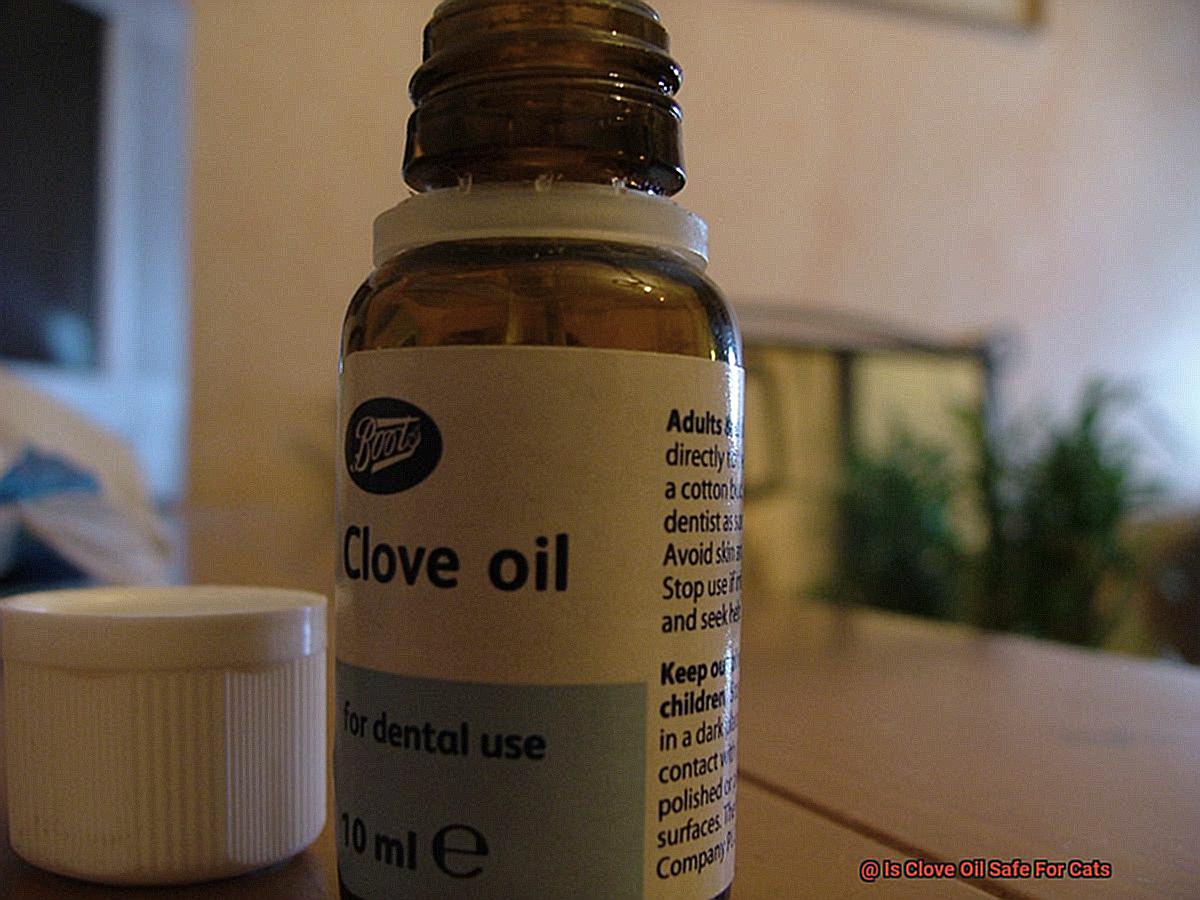Clove oil is a common essential oil used in many products, including toothpaste, perfumes, and cleaning supplies.
But is it safe to use on cats? The answer is no.
Clove oil contains eugenol, a chemical that can be dangerous when ingested in large amounts.
Even small amounts can cause stomach upset and eye irritation.
Plus, the odor of clove oil can irritate your cat’s sensitive nose.
However, there may be some benefits to using clove oil on cats with certain health problems.
It has been shown to reduce inflammation and pain associated with arthritis in older cats.
It can also help with minor skin irritations such as mosquito bites or abrasions.

Always consult with your vet first before using any of the essential oils on your cat.
They will be able to advise you on the right course of action based on your cat’s individual needs and health history – ensuring any therapy you use is safe and effective for your beloved pet.
What is Clove Oil?
Clove oil is a powerful natural remedy, extracted from the flower buds of the clove tree native to Indonesia.
With its warm, spicy scent, it has been used for centuries to treat a variety of ailments.
Its antibacterial, antifungal, antiviral, and anti-inflammatory properties make it an effective healer for toothache, headaches, indigestion, and even pests.
Beyond its medicinal uses, clove oil can also be used in aromatherapy to bring a sense of calm and relaxation.
Its comforting scent provides stability during times of uncertainty and can help to soothe tired muscles and minds alike.
Clove oil is an amazing natural remedy that should not be overlooked.
Is Clove Oil Safe for Cats?
When it comes to cats, clove oil is a definite no-no.
The active ingredient, eugenol, can be toxic to cats and cause skin and mucous membrane irritation, as well as liver toxicity.

Clove oil should never be used on cats without first consulting a veterinarian.
Cats are especially sensitive to essential oils, so it’s important to use caution when using any essential oil around them.
Ingesting clove oil should be avoided at all costs as a flea killer or repellent for cats – it’s like playing with fire.
The smell of cloves can also be overwhelming for cats.
If you’re using clove oil in a diffuser, make sure that it is placed in an area where your cat won’t find it and the room is well-ventilated.
Otherwise, the pungent aroma could be too much for your kitty’s delicate nose.
So, clove oil is not safe for cats and should never be used without consulting a veterinarian first.
Cats are more sensitive to essential oils than other animals, so exercise caution when using any essential oil around them.
Potential Benefits of Clove Oil for Cats
Clove oil is like a miracle cure for cats. It has many potential benefits that can help your furry friend stay healthy and happy.
Clove oil can be used as an antiseptic, thanks to its anti-inflammatory and antimicrobial properties, which can help reduce pain and inflammation associated with arthritis and other joint issues.
It may also be beneficial in treating skin conditions such as flea allergies or dermatitis.
Additionally, it can repel cats from certain areas, such as the garden or furniture.
And if your cat is prone to anxiety, clove oil may even reduce their stress levels.
The Dangers Of Ingesting Clove Oil
It’s important to note that clove oil should never be ingested by cats because of its high concentration of eugenol which can cause liver damage if taken in large doses over time.
If you suspect that your cat has ingested any amount of clove oil, consult your veterinarian right away for tips on how to continue with therapy as soon as possible.
How to Use Clove Oil on Your Cat
Clove oil is a great natural remedy for cats, providing antiseptic, antifungal and antibacterial properties that can help protect your feline from fleas and other insects.
When used correctly, it can be an effective way to keep your cat safe from pests without resorting to harsh chemicals or toxins.
- Before using clove oil on your cat, it’s important to dilute the oil with a carrier oil such as coconut or jojoba oil. The recommended ratio is one part clove oil to ten parts water or carrier oil. It’s also critical to test a small patch of skin first and then wait 24 hours before applying it over a larger area.
- Once you’ve diluted the clove oil properly, you can apply it topically to your cat’s fur, avoiding their eyes, nose and throat. You can also use clove oil in a diffuser at home, but only in small amounts for short periods of time as too much may cause an allergic reaction in some animals.
- However, it is not recommended for cats under the age of 8 weeks old as their bodies are still developing and may be more vulnerable to essential oils like clove oil.
Potential Risks of Using Clove Oil on Cats
Using clove oil on cats can be a risky endeavor.
The essential oil contains eugenol, which can be toxic to cats if ingested and cause serious organ damage.
Inhaling clove oil can also cause respiratory irritation and distress, particularly in kittens and smaller cats.
Applying the oil directly to a cat’s skin or fur may result in skin irritation and redness, while using it near a cat’s eyes or nose could lead to severe damage.
It’s like navigating a minefield when treating your cat with clove oil – one wrong move and you could have an unhappy and injured pet.

To avoid potential injury, it is best to consult with your veterinarian about safe alternatives for treating your feline friend.
Alternatives to Using Clove Oil on Cats
Fleas can be a pesky problem for cats, but using clove oil to get rid of them isn’t always the best option.
Luckily, there are several alternatives that will help keep your kitty flea-free.
Topical flea treatments are an easy way to get rid of fleas without having to resort to harsh chemicals or essential oils.
These medications can be purchased from your local pet store and should be applied according to the package’s instructions.
Lavender, chamomile, and geranium are essential oils that are safe for cats.
These fragrant oils can be used in a diffuser or diluted in a carrier oil and then applied topically.
Not only will they soothe your cat’s senses, but they’ll also help keep pesky fleas away.
If you’re looking for an alternative to clove oil, natural repellents such as cedar chips and citrus peels can also do the trick.
Sprinkle some around your cat’s bedding or plant citrus peels in areas where they like to hangout.
No matter which method you choose, it’s important to consult with your veterinarian before using any products on your cat – including essential oils or natural remedies.
Essential Oils That Are Safe For Cats
Essential oils can be a great way to provide natural remedies for cats, but it is important to be aware of the potential risks.
Clove oil is not recommended as it can be toxic to cats and should be avoided.
Fortunately, there are several essential oils that are safe and beneficial for cats.
Lavender oil is one of the most popular and can help with flea control and calming.
Chamomile oil is another great choice as it has anti-inflammatory properties and can help reduce stress in cats.
Geranium oil is also a popular option because it helps kill fleas and ticks while still providing a pleasant fragrance.
When using essential oils on cats, it’s always best to dilute them with a carrier oil such as coconut or almond oil.
This will help minimize adverse reactions caused by allergic reactions while still allowing your cat to reap the benefits of the essential oils.
It’s also important to research each individual essential oil before using them on cats as some may be toxic or have other adverse effects.
Conclusion
Clove oil is not safe for cats.
Ingesting it can be lethal, as the chemical eugenol present in clove oil can cause serious organ damage.
Inhaling it can lead to respiratory distress, and applying it directly to their skin or fur can result in irritation and redness.
Rather than risk your cat’s wellbeing, there are plenty of safer alternatives for flea control and other medications.
Flea collars, spot-on treatments, cedar chips, citrus peels—all these are safe options that won’t put your cat in danger.
Plus, many essential oils—lavender, chamomile and geranium—are safe for cats when used correctly.
When it comes to your cat’s health and well-being, consulting with a veterinarian is always the best choice.







